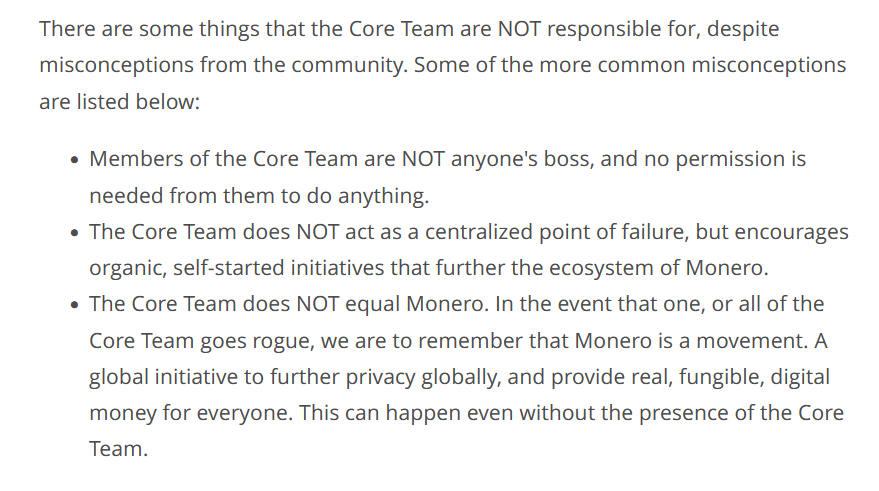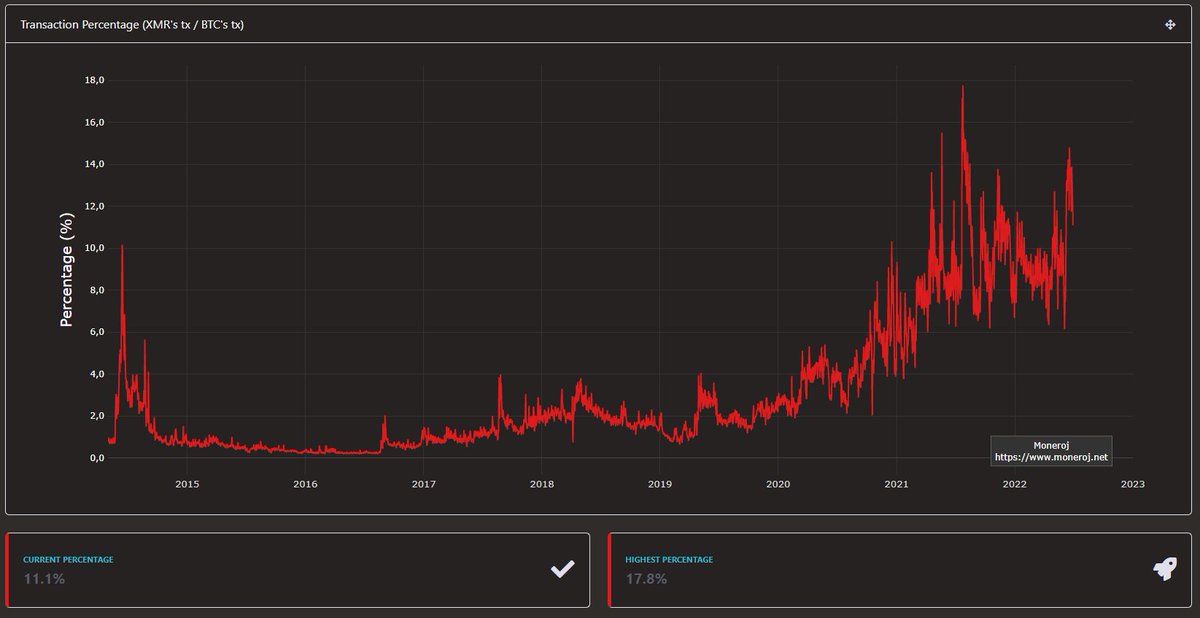
🚨MONERO NETWORK UPGRADE (HARDFORK) 🚨
A Short History Of #Monero Network Upgrades, and What The Upcoming Network Upgrade In August 2022 Means To You!
A Short History Of #Monero Network Upgrades, and What The Upcoming Network Upgrade In August 2022 Means To You!

Since #Bitcoin’s blocksize war came to a head in 2017, hardforks of blockchain protcols have been largely stigmatized. A Bitcoin maximalist is likely to tell you hardforks are bad, however this mindset or approach can stifle innovation and development.
We have seen many other protocols blossom in regards to innovation and development when they welcome improvements. 

Stablecoins, #NFTs, #privacy etc, have all found a home on more innovative blockchains protocols, whereas #Bitcoin development has remained somewhat stagnant. This has been reflected in market valuations, with Bitcoin Dominance down to 42% - half it was five years ago. 

In contrast to this, while protocol development and innovation may be considered productive, it also sacrifices decentralization and security. @nic__carter provides an overview of this in the image below.
(src: forbes.com/sites/steveneh…)
(src: forbes.com/sites/steveneh…)

Innovation can allow a project to 'move fast and break things', while the calcification of a protocol leads to better decentralization as it minimizes governance and developer intervention.
So should a blockchain protocol undergo a hardfork? How does one decide whether to innovate or ensure decentralisation and security? @BitcoinMagazine explored this issue back in 2015, questioning whether #Bitcoin should have regular hardforks.
bitcoinmagazine.com/technical/shou…
bitcoinmagazine.com/technical/shou…
Hardforks are not evil. A hard fork is simply a ‘NETWORK UPGRADE’, and as long as the network upgrade is consensual and agreed upon by stakeholders, hardforks are a net benefit. Users simply agree to upgrade their nodes and follow the new rules. 

Monero network upgrades are a balance between protocol innovation and calcification. We all want the best financial privacy technology, however caution must be taken and tradeoffs must be considered.
To achieve this #Monero occasionally undergoes consensual network upgrades.
To achieve this #Monero occasionally undergoes consensual network upgrades.
Unlike the #Bitcoin community, #Monero’s grassroots community is smaller than Bitcoin’s, so reaching a consensus among stakeholders (developers, miners, users, etc) to upgrade the network is easier. There is rarely serious conflict within the Monero community. 

Up until 2019, #Monero underwent network upgrades every six to twelve months in order to ensure miner dencentralization, and include the newest and best technology possible.
In 2019 #Monero’s codebase has began to calcify with the successful implementation of Random-X, a Proof of Work mining algorithm successfully implemented to vanquish ASIC/GPU miners and incentivise only CPU miners. Thanks tevador, SChernykh & @hyc_symas!
github.com/tevador/RandomX
github.com/tevador/RandomX
#Monero network upgrades are less frequent these days, and the previous Monero network upgrade took place almost two years ago.
(src: github.com/monero-project…)
(src: github.com/monero-project…)

While #Monero network upgrades once occurred regularly, this doesn’t mean calcification of the protocol wasn’t already taking place.
For example, not long after #Monero’s inception, Monero’s tail emission rate has remained unchanged for well over 7 years and is considered to have reached a state of true calcification.
(src: bitcointalk.org/index.php?topi…)
(src: bitcointalk.org/index.php?topi…)

Any attempt to change a fundamental aspect of Monero, such as the Tail Emission, would simply be rejected by the Monero community, and likely result in a similar outcome to Bitcoin’s 2017 hardfork, with the majority of stakeholders remaining with the original calcified protocol.
So when is Monero’s next network upgrade?
#Monero is scheduled to undergo a network upgrade on ~13th of August 2022, at block 2,688,888. This is a CONSENSUAL upgrade agreed upon by the Monero community in order to improve Monero’s privacy and performance.
getmonero.org/2022/04/20/net…
#Monero is scheduled to undergo a network upgrade on ~13th of August 2022, at block 2,688,888. This is a CONSENSUAL upgrade agreed upon by the Monero community in order to improve Monero’s privacy and performance.
getmonero.org/2022/04/20/net…
#Monero developers, researchers, and the broader community agreed this scheduled network upgrade to be beneficial. This has been the case for all past upgrades.
There is no CEO or central authority exclusively deciding on the development of #Monero. However, there is a Core Team acting as custodians of the project.
getmonero.org/2018/03/01/cor…
getmonero.org/2018/03/01/cor…

Before any network upgrade, #Monero contributors spend hours discussing potential improvements, trade-offs, write and check code, commission audits from third parties, and run things on the Monero testnet to ensure protocol security. 

This isn't a comprehensive list of what takes place leading up to a #Monero network upgrade. I am no doubt glossing over what goes into the development and implementation of a network upgrade as I've never been deeply involved in the process, but it gives you an idea what occurs.
#Monero’s network upgrade will include a variety of new features such as:
• Ring-size increase from 11 to 16 to increase privacy
• Viewtags to reduce wallet-sync times by up to 40%
• Bulletproofs+ to reduce transaction sizes by ~7% and improve verification performance by ~7%
• Ring-size increase from 11 to 16 to increase privacy
• Viewtags to reduce wallet-sync times by up to 40%
• Bulletproofs+ to reduce transaction sizes by ~7% and improve verification performance by ~7%
As privacy technology develops, #Monero is still likely to go through network upgrades as needed, albeit with less frequency e.g. once every 3 yrs, then 4yrs, then 5yrs etc.
This will help balance the need for both protocol innovation and calcification, and provide maximum usability, scalability, security, and privacy for all users. #Monero recently turned 8 years old, and remains the premier cryptocurrency for those requiring privacy. 

#Monero makes up the majority of all private cryptocurrency transactions, and has 3x the marketcap of #Zcash. This network upgrade will no doubt solidify its place as the cryptocurrency of choice for those needing easy to use default privacy.
(src: @CoinMarketCap, @JEhrenhofer)

(src: @CoinMarketCap, @JEhrenhofer)


@CoinMarketCap @JEhrenhofer #Monero is still the only cryptocurrency known to be untraceable by chain analysis. In 2020 the IRS put out a $625k bounty for whoever could deterministically trace a #monero transaction! Still no one ever has!
(src: techinquiry.org/FOIA/Coinbase-…)
(src: techinquiry.org/FOIA/Coinbase-…)

@CoinMarketCap @JEhrenhofer If you want to learn more about #Monero’s upcoming network upgrade, please check out the official Monero website in the tweet below. The network will require all users to update their software.
The new software is v0.18 "Fluorine Fermi", and has been released in preparation for the network upgrade and can be downloaded from the official Monero website which can be found here - getmonero.org/downloads
The network upgrade will not result in #Monero holders receiving free coins. $XMR will remain XMR, there will be no new #XMR token. There is nothing you need to do except make sure your wallets and/or nodes are updated. Exchanges will have everything sorted for you.
Check out this great guide from @RINOwallet providing you with resources to help you prepare for the network upgrade!
reddit.com/r/Monero/comme…
reddit.com/r/Monero/comme…
If you want to help with Monero’s upgrade, be it simply notifying wallet or exchange providers, please check out this ‘upgrade checklist’ to ensure all parties appropriately update their software and make the necessary changes.
github.com/monero-project…
github.com/monero-project…
If you liked this thread or are interested in Monero, sign up to a FREE #Monero newsletter I write to stay up to date with all the latest Monero news. It covers Monero tech development, general news, events, speculation, memes, and more.
themoneromoon.com
themoneromoon.com
You can also read some of my other tweet threads about Monero below:
If have any questions, or are a Monero curious person, reddit.com/r/monero is a great place to visit and ask your questions! The community is welcoming and friendly and the mainsub is void of memes and price talk, it's all about the tech!
• • •
Missing some Tweet in this thread? You can try to
force a refresh






